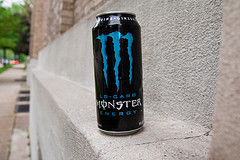Lawmakers Call Out Energy Drink Makers For Inconsistent Labeling, Shady Marketing Practices
Despite repeated reassurances to the public that their energy drinks are safe and not marketed to kids, a group of lawmakers is calling the manufacturers of those drinks out for a variety of concerns listed in a new report. From labeling practices to potentially unsafe amounts of caffeine, the report details widespread labeling inconsistencies, questionable marketing practices and how much caffeine is in those beverages.
Congressman Ed Markey (D-MA) and Senators Dick Durbin (D-IL) and Richard Blumenthal (D-CT) out 14 companies under the microscope in the report titled What’s all the buzz about?: A Survey of Popular Energy Drinks Finds Inconsistent Labeling, Questionable Ingredients and Targeted Marketing to Adolescents (say that three times fast, we dare ya.)
A few highlights from the report:
QUESTIONABLE MARKETING
The lawmakers found that there’s a lot of inconsistency in how the companies peddle their wares, with some calling the drinks dietary supplements and others simply as beverages. This can lead to confusion for consumers, especially as some companies list caffeine content on the can for one drink and then not another. Varying sizes come with different amounts of caffeine, often in amounts that the Food and Drug Administration says is unsafe for sodas.
And then there’s the issue of selling the drinks to kids — all the companies claim they don’t target children, but the report says there’s evidence that adolescent consumers are often the targets of marketing pitches, using unconventional marketing methods like social media combined with product design and where the products are placed on store shelves.
CAFFEINE, SO MUCH CAFFEINE
There’s a whole lot of caffeine in them thar drinks, notes the report. Coca-Cola’s NOS has the most, clocking in at 260 milligrams per 16 ounce can, while Target’s Archer Farms drink only has 70 milligrams in the same size can.
And in some cases, like Monster’s Worx Energy shot, the level of caffeine isn’t disclosed on the label. Rockstar is in the midst of changing its labeling practices, causing some cans to have the caffeine listed on the label and others, not so much. All in all, it’s confusing.
UNSUPPORTED CLAIMS
The report says energy drink companies make a bunch of claims related to their product and the purported benefits of drinking them. But in general, these claims aren’t substantiated by the FDA. For example, Pepsi’s AMP Energy Boost says it will help “energize and hydrate the body,” while Coca-Cola’s NOS promises “50% more focus.” Those claims could also be seen as aimed specifically at young people, like high school athletes.
CRAZY INGREDIENTS
So of course there’s caffeine, but the report indicates that energy drinks also contain a myriad of specialty ingredients in combinations that haven’t been thoroughly evaluated. Basically — who really knows what microguaranbulltestium is anyway? And is it okay to drink? Who knows.
WHAT NOW?
The report outlines recommendations for energy drink companies in order to increase transparency and protect consumers, with labeling guidelines proposed by the lawmakers that would clearly describe the drinks’ contents. And also, companies should stop marketing the beverages to children under 18, says the report. It also calls on energy drink makers to report adverse events associated with energy drinks to the FDA.
In response to today’s report, Consumers Union, the advocacy arm of Consumer Reports, applauded the efforts of the three lawmakers and expressed support for their findings.
“Consumers may not really know what they’re getting when they consume energy drinks. Part of that is that the labeling isn’t always clear about the total amount of caffeine in the drink, as Consumer Reports testing found,” said Ami Gadhia, senior policy counsel for Consumers Union. “With increasing reports of the adverse effects from these products surfacing, this report shines another light on these concerns. We believe the FDA needs to take a hard look at the effects of energy drinks, especially when it comes to young children and teens that are often the target of marketing and advertising.”
You can read the entire report by clicking here.
Want more consumer news? Visit our parent organization, Consumer Reports, for the latest on scams, recalls, and other consumer issues.


